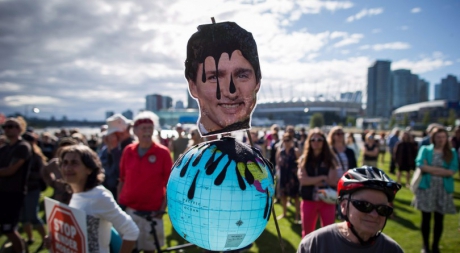Reports
You are here
Governments promises evolve too slowly for climate crisis

November 5, 2021
World leaders at the G20 meetings finally agreed that 1.5 degrees is the right ambition, but Justin Trudeau attempted to pose as a climate champion by claiming that Canada, along with other countries, "would have liked stronger language and stronger commitments."
Then, on November 1st at the COP26 meetings in Glasgow, he announced a new policy: "We'll cap oil and gas sector emissions today and ensure they decrease tomorrow at a pace and scale needed to reach net zero by 2050."
But critics, like Dale Marshall of Environmental Defence, argue that "focusing on emissions from oil and gas production but not production itself will allow oil and gas companies to keep putting forward false solutions, such as carbon capture and storage, fossil-based hydrogen, and far-off net zero plans, all while pumping out more and more atmosphere-destroying fossil fuels."
These continue and expand on existing market based solutions to solving the climate crisis, like the carbon tax, carbon offsets and emissions trading. Rather than actually reducing emissions at the rapidity that is called for, these create new arenas for profitability for businesses but have proved to be ineffective in actually reducing emissions.
The term "net-zero" has made it easier for Trudeau to peddle false solutions. A serious climate plan would focus on actual reductions in carbon emissions, mandating and supervising the phasing out of fossil fuel production, reducing overall energy use and ramping up zero-carbon emissions energy production. This would mean confronting the fossil fuel industries that are profiting from the destruction of the planet.
This is something that the Canadian state is not prepared to do, because fossil fuel production and infrastructure are key sources of profit at the centre of the economy. In 2006, then PM Harper declared that Canada was "an emerging energy superpower", attracting investment for tar sands development under favourable conditions with a high price of oil. The hollowing out of the manufacturing sector during the economic crisis a couple years later has further increased this reliance on fossil fuels for profits.
While fossil fuel producers like Canada have a particular interest in maintaining the status quo, all nations around the world rely on fossil fuels for energy to drive economic activities. They know they need to be seen to be doing something, so the COP meetings over the years have developed market based approaches to encourage a shift to lower carbon energy such as carbon pricing, trading and offsets. Massive investments are being made in carbon capture and storage (CCS) technologies, despite the fact the energy required for such systems to work is huge - and must be zero carbon for the process to draw down carbon emissions. A more rational policy would be to skip CCS and just grow zero carbon energy production capacity.
There is one force that has confronted the fossil fuel industry: Indigenous land defenders asserting their sovereignty in the face of hydrocarbon megaprojects, including the Wet'suwet'en people in opposition to the CGL pipeline, and the Secwepemc people in opposition to the TMX pipeline, the centre of the Liberal climate plan. According to a recent Indigenous Climate Action report, such resistance had stopped or delayed 25% of annual emissions across Turtle Island.
And in recent years, growing support for these struggles from broader layers of the settler population, driven by the growth of the climate justice movement, has created a momentum from below that is forcing change. Just before the pandemic lockdown in February 2020, the #ShutDownCanada movement blocked rails, roads and ports in solidarity with the Wet'suwet'en people who are standing up to the CGL pipeline and RCMP arrests and violence. Through the pandemic, the eruption of the Black Lives Matter movement globally, put a spotlight on racial justice, and the confirmation of Indigenous genocide at Indian Residential "Schools" has undermined the legitimacy of Canada for broader layers of the settler population than ever before.
On November 6, actions will be happening globally calling for climate justice at COP. This means real action to reduce emissions, led by the world's leading economies who are most responsible for historic emissions. It means advanced economies paying a climate debt to the countries of the global south to pay for mitigation and adaptation. It means respecting Indigenous sovereignty and creating Just Transition pathways for communities and workers to a liveable future, including those marginalized under capitalism. This movement needs to grow and deepen to puncture the illusion of leadership from the top, and create a force that can push for the transformation that we need.
There is no time to waste.
Section:









